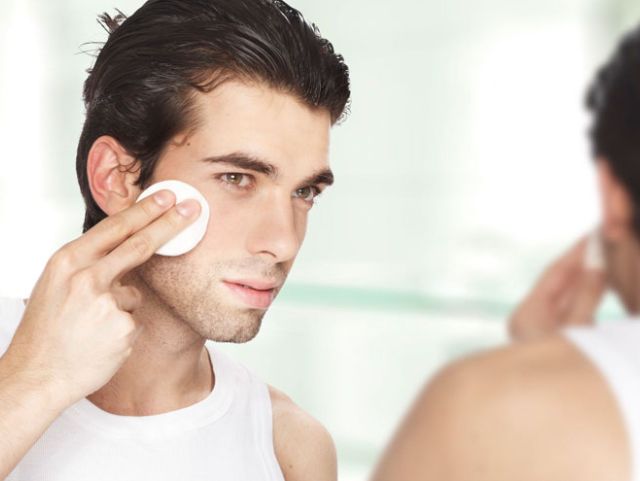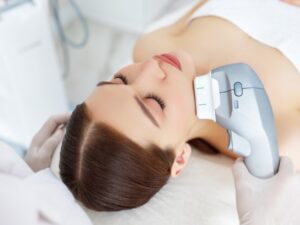Today’s man is very aware and conscious about self-grooming and flawless skin. The motivation may vary from professional demands, relationships, remarriage, fashion dictates or peer pressure. Dermatologists like me have taken note, and the following article is dedicated to skin care and grooming for the modern man, irrespective of age or class.
Skin care requirements for men and women are very different. While women come forth with specific problem areas or beauty goals to achieve, men generally look for a more relaxed and refreshed look. Men are also generally more exposed to sunlight, sweat, dust, trauma, friction, tobacco smoke and pollution. Besides, they have their own problem areas like razor burns, cracked lips or uneven hairline on the beard. Women tend to be better patients and are disciplined and regimental when it comes to their skin care routine. My male patients tend to be keener on easy-to-follow skin care regimes, matte finish creams and minimal-downtime procedures. They are not very good at keeping follow-up appointments, do not tolerate pain as well as women do, and they hate a feminine look or a girly skin-care regime. Male skin, male anatomy, environmental and hormonal influences, skin biology, skin behaviour and ageing varies between men and women. For instance, the beauty ideals for perfect lips or eyebrows vary between men and women. So unless your dermatologist has a keen eye and an artistic hand, he/she might end up giving you a woman’s pout or high arched eyebrows. Only a well-trained dermatologist with a knack for facial aesthetics will follow a gender specific approach to skin and facial assessment, counselling, management and follow up.
How does male skin differ from female skin? A man’s skin is 20-30% thicker and more resilient. So cosmetic creams and chemical peels do not penetrate as well or as deeply. Also, men have more collagen and elastin in their skin, giving their skin better elasticity so male skin does not sag or wrinkle as much as female skin. Men also have more sweat and oil glands in their skin. Which is why, some of the most common complaints include dandruff, oily skin and open pores. Use cleansers containing salicylic acid. Toners and astringents keep oil secretion under control, and tighten open pores. But avoid astringents which are alcohol based; look for one containing witch hazel instead. Use a gel or lotion based moisturizer. Use a light-weight sunscreen in a spray formulation. Most of the oily-skinned men I meet wash their face 5-6 times a day and do not use moisturizers as they fear an acne outbreak from applying creams on the face. This habit will only aggravate your oil glands into working over-time to compensate for the dryness caused by repeated washings. The right moisturizer will calm down the oil glands without causing pimples. There are various face packs and masks, which can leave your skin looking fresh and matte for a few days. Home microdermabrasion kits and mild chemical peels (done at the dermatologist’s office) can also reduce oil secretion on the face. Vichy, Loreal, Neutrogena, Clarins and Nivea have all come up with an affordable line of skin care products designed for men.
Hair is another area of concern for men. Too much on the body, too little on the scalp and razor rashes on the face, to be specific. Men drive the market for the multi-billion dollar hair rejuvenation market. This includes hair growth serums, shampoos, oils, pills, laser combs, stem cells, injections, wigs, weaves and hair transplants. Minoxidil (Rogaine) is still the best bet but the fight against balding is a life-long commitment and an uphill task. More and more men are coming forward for laser hair removal procedures for problem areas like the ears, a unibrow, or a hairy back. Even men who like facial hair get laser treatments done to get rid of stray hair on the upper cheeks and lower neck, or to seek the perfect beard line. Razor bumps are basically ingrown hair caused by cutting beard hair too close and too frequently. Use warm water and a shaving cream with aloe. Leave it onto your skin for a minute to let it soften facial fuzz before you shave. Electric shavers cause less irritation than razors, but if you cannot afford them, then choose a single or double blade razor with an inbuilt moisturizing strip. Use a good after-shave lotion and then apply a moisturizer containing glycolic acid or salicylic acid. In severe cases, your dermatologist will prescribe oral antibiotics and an antiseptic cream which you can use in place of a moisturizer.
Excessive sweating and body odour drive several men into the doctor’s office. Unless its a recent development, doctors don’t usually prescribe any tests or tranquilizers. Bromhidrosis is the medical term for body odor from the pits and/or soles of the feet. This could be aggravated by excessive sweating, poor hygiene, high environmental humidity, stress, aromatic foods in your diet (garlic, onions etc), hormonal changes (for eg, during puberty) or bacterial and fungal infections like Athlete’s foot. Consult a dermatologist for advice on proper hygiene and use of medical grade antiperspirants and anti-fungal dusting powders. Your dermatologist can also rule out infections or medical conditions which may be causing that funky stink. Discuss medical options like Botox injections, Iontophoresis or Laser treatments which can reduce perspiration. Do-it-yourself tips include bathing twice a day with a triclosan or tea-tree oil containing soap, getting rid of unwanted hair in the pits and pubes, regular foot scrubs with pumice stone, using foot deodorants, and wearing light-weight cotton socks that allow your feet to breathe. Does your scalp and hair smell bad? Smelly scalp syndrome is also caused by all the factors mentioned before, including helmet hair or even a smelly towel. Use an anti-bacterial shampoo every day, cut back on smoking, change your hair brush regularly and drink plenty of water to get rid of the problem. Home remedies like tea tree oil shampoo, tomato juice, lemon juice and vodka hair rinses can help as well.
Zits and facial redness can be a source of embarrassment. Over-the-counter measures include tea tree oil containing face washes and salicylic acid containing soaps for bathing. Use an anti-redness moisturizer like the Avene Sensibio forte cream. Avoid alcohol, spicy food and facials, and visit a dermatologist if the do-it-yourself remedies don’t help.
Anti-ageing skin care is increasingly becoming a prime concern for my male patients, and not just for the models. Start using sunscreen and moisturizer from an early age, add alpha-hydroxy acids and peptide based creams in your 20s and 30s, and switch to retinoic acid containing creams from your 40s. Older men use Botox and Dermal Fillers to get rid of wrinkles and lines on the face, but younger men use Botox and Fillers as well, to contour a heavy jaw, correct a gummy smile, or to create a well defined nose bridge. Resurfacing lasers and radiofrequency based devices work well on men- they can help you achieve firm and taut skin which is free from lines and spots. Smokers, drinkers and menwho are outdoors a lot will obviously age faster.
If you are a light-skinned man living in a hot or tropical country, then you need to get regular mole screenings done by a qualified dermatologist, every two years after the age of 35. If skin cancer runs in your family, you need to check in more frequently. If a mole changes color, grows in size, bleeds, itches or ulcerates, have it checked out. Melanomas can occur in areas which are not typically exposed to the sun, for example, you back, thigh or the soles of your feet. A medical grade high SPF broad-spectrum sunscreen is a must, not just to keep wrinkles and age spots away, but to protect against skin cancer as well.
Scars from acne and trauma can wreck the strongest man’s self esteem. While it is impossible to wipe them away completely, dermatologists have a huge arsenal of treatment options which give brilliant results. These include creams (Cicatrix, Bio-Oil), fillers, lasers, microneedling and/or minor surgery. Unwanted tattoos can also be removed using lasers. The treatments are painful, expensive and require multiple sessions, but one can achieve 80-90% removal of all tattoo pigment. Unfortunately, the green, red and pale tattoos will never completely go away.
Foot care is especially important for a man who is active and sporty. Besides proper hygiene and the occasional use of anti-fungal dusting powder on a humid day, using foot creams and getting monthly foot scrubs and pedicures can help keep corns and calluses away. Wear comfortable footwear with thick soles and perfectly fitting insoles- this is important to keep the skin, soft tissues and bones of your feet healthy for a long time. Never walk bare feet on wet surfaces like the pool or the gym shower or you run the risk of getting painful warts on your soles.
Last but not the least, for skin that truly stands out with good health, take care of your diet. Keep your weight in check, keep yourself well-hydrated, take your vitamins and antioxidants and get plenty of protein and omega-3-fatty acids. Hopefully this article has helped you gain some insight on how to take care of your skin and overall appearance. For any further concerns or clarifications, feel free to visit www.facebook.com/yourfamilydermatologist and drop a message.




